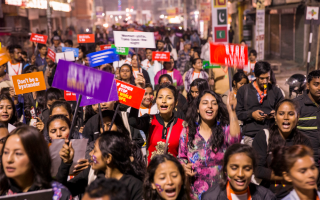Engaging Safely at the UN
Engaging Safely at the UN aims to ensure young people's inclusive and safe engagement at the UN, addressing discrimination, harassment, and abuse. The online training provides youth-friendly guidance on United Nations(UN) reporting mechanisms and safe participation, using real-life examples to educate on preventing harmful behaviours.
Since the adoption of the first-ever system-wide UN youth strategy, Youth 2030, more young people than ever before are engaging with the UN at all levels. While the vast majority of young people have positive experiences during these engagements at the UN, unfortunately, there are instances of exposure to harmful behaviours.
The Engaging Safely at the UN online training was created by the UN Youth Office with inputs from UN partners, civil society, and young people. It aims to ensure an inclusive and safe space for all young people engaging with the UN by addressing misconduct, such as abuse of authority, discrimination, harassment (including sexual harassment), and sexual exploitation and abuse.
This training builds on the UN’s comprehensive code of conduct and acknowledges the power dynamics rooted in age that can contribute to such misconduct. Through various examples inspired by real-life events, the training aims to:
· Build the capacity of young people to react to unwelcome conduct by raising awareness about the existing UN reporting mechanisms;
· Encourage a variety of response options, including official reporting and bystander interventions;
· Ensure that young people have a clear understanding of the UN’s responsibility in preventing and addressing harm against them arising from actions and behaviours of UN staff and other actors in a UN setting.
Engaging Safely at the UN is a self-paced online course developed by the UN Youth Office and hosted on the UNSSC E-lounge platform.
After registering, you will be granted immediate access to the learning platform and all learning materials.
The Engaging Safely at the UN course features five learning modules:
1) Key terms and definitions;
2) Harassment, discrimination and abuse;
3) Making a complaint;
4) Anticipating and dealing with challenges;
5) Conclusions
The course is self-paced and features different exercises, such as quizzes, case scenarios, and a self-reflective journal.
This training is for all young people engaging with the UN in the context of events, conferences, intergovernmental and multi-stakeholder processes, working groups and meetings at UN locations.
The Engaging Safely at the UN training is offered free of charge.


